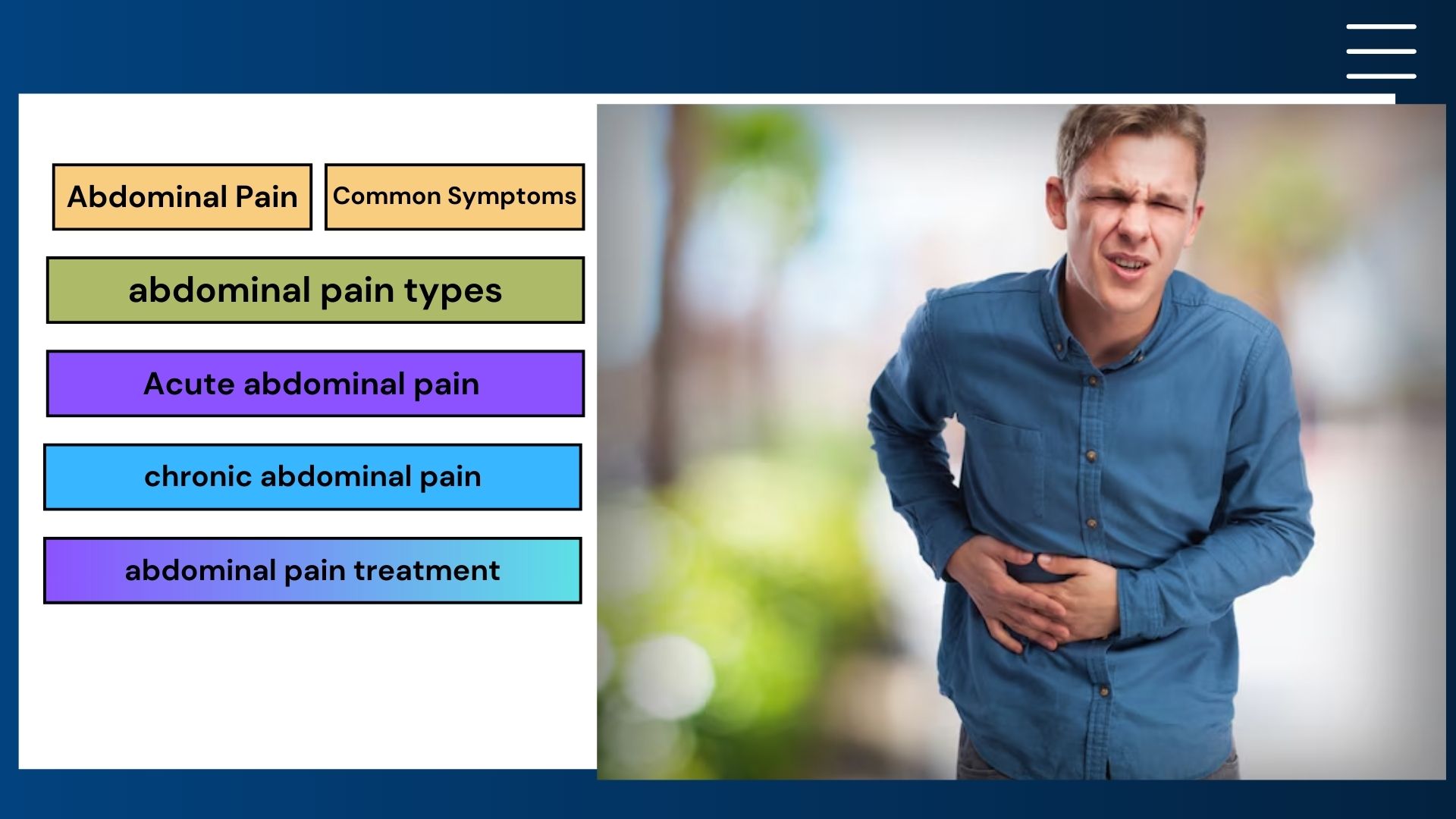As life advances, people are more exposed to different health problems. One such problem is abdominal pain. It is a common problem that many people worldwide are experiencing now. It can feel mild or severe and can happen for many different reasons.
When you understand the type and location of the pain, you can easily know the factor that may be causing it. By learning more about abdominal pain, you can take the right steps to manage it and know when to see a doctor. In this blog post, we will discuss all these important points like abdominal pain, why it happens, and how to feel better. So, keep reading!
What is Abdominal Pain?
Abdominal pain is any pain or discomfort patients feel in the middle of the chest up to the lower abdomen. This part of the body is home to many organs, including the stomach, liver, intestines, gall bladder and kidneys; thus, pain may originate from any of these organs. Sometimes, it can be sharp, sometimes dull, sometimes crampy or even produce something akin to a burning sensation.
Types of Abdominal Pain
There are different types of abdominal pain, but major abdominal pain types are as follows;
Acute Abdominal Pain
Acute abdominal pain comes on suddenly and is usually strong. It lasts a short time, from a few hours to a few days. It signals a serious problem that needs quick attention. Common causes include appendicitis, gallstones, or a blocked intestine. This pain can also be due to infections like food poisoning or a burst ulcer. You should see a doctor quickly if you feel sharp and sudden pain.
Chronic Abdominal Pain
On the other hand, chronic abdominal pain lasts for a long time—weeks, months, or even years. It may not be as intense as acute pain, but it can come and go, making daily life difficult. Chronic pain is often linked to conditions like irritable bowel syndrome (IBS), inflammatory bowel disease (IBD), or endometriosis. Medication, diet changes, and therapy can improve this condition.
What are the Symptoms of Abdominal Pain?
The symptoms of abdominal pain vary with each person and depend on the cause. But the most common symptoms that can accompany abdominal pain are;
Heartburn
Belching, burping or bloating
Loss of appetite
Changing bowel habits
Urinating problems
Fever
Vomiting and nausea
Bleeding in urine or stools
Constipation or diarrhoea
If you see these symptoms in addition to pain in your abdomen, you must take some medical support and contact an experienced doctor.
What are the Causes of Abdominal Pain?
Abdominal pain is a very common complaint, and it has diverse causes, which can be acute or very serious. It is also important to recognise the affected organ in the abdomen so that the right action can be taken. Here, we list the most common reasons for the onset of abdominal pain and some details about each of them.
Infections
Infections can help bacteria get into the digestive tract, and they can cause pain in the abdominal area. Common infections associated with this pain include;
Intestinal infections
Throat infections
Blood infections
Inflammation
Inflammation is a significant trigger of abdominal pain and can occur in various organs and structures, leading to conditions such as:
Appendicitis ( inflammation of the appendix).
Crohn’s disease (a type of IBD that affects the lining of the digestive system).
Hepatitis (inflammation of the liver).
Abnormal Growth
Abnormal growths in the abdomen may also cause abdominal pain. It may include cancerous growths or cysts in organs like the liver, kidney or reproductive systems.
Obstruction
Obstruction of the gastrointestinal tract means that the regular movement of contents is hindered and will end in pain. Some common causes of obstruction-related pain are;
Intestinal obstruction
Small stones that develop in the gallbladder which may obstruct the bile ducts
Kidney stones that may form in the urinary tract and block the flow of urine
Intestinal Disorders
Intestinal diseases may present symptoms such as abdominal pain and changes in bowel habits. Some noted examples are chronic constipation, nervous stomach, irritable bowel syndrome (IBS), or gastroenteritis (stomach flu).
How can Abdominal Pain be Treated?
The abdominal pain treatment depends on its severity, so we provide different methods that you can apply at different stages to prevent it.
At Home Care
Mild abdominal pains disappear in the next couple of hours or days. But you should take the following steps to avoid its harmful effects;
Take plenty of water and avoid alcoholic drinks and beverages such as tea and coffee that contain caffeine.
Stay away from foods that are oily, creamy or contain spices.
Take adequate sleep and rest.
Put a hot water bottle or warm wheat pack on the abdomen region.
Consult your pharmacist with information concerning the usage of basic analgesic medicines.
Always seek your doctor's services if the pain is more severe or returns.
Abdominal Pain Medicines
Sometimes, the only solution to abdominal pain is the medicine from a pharmacy. Your pharmacist will advise you to take medicines that suit your conditions. After knowing the cause, the most commonly recommended abdominal pain medicines include;
Antacids for indigestion or heartburn
Anti-flatulence medicines
Simple pain-killers
Antispasmodic drugs to relieve spasms in the bowel wall
These medicines will positively affect you only when you change your diet.
Note: Don’t use anti-inflammatory medicines or aspirin for treating abdominal pain because such medicines cause bowel problems or stomach aches.
Final Thoughts!
We will summarise this article by saying that when you feel abdominal pain, do not immediately assume it is serious. Sometimes, it may be fine. However, if the pain keeps returning or worsens, seeing your doctor is a good idea. If the pain is very strong or sudden, seek medical help immediately to find out what is causing it and get the right treatment.
Such signs need your attention. Keep track of any patterns, like certain foods or activities that are increasing the pain, and tell your doctor. Early treatment can help prevent more serious issues


Leave Comment